Published by Dr. Brandon Richland, MD
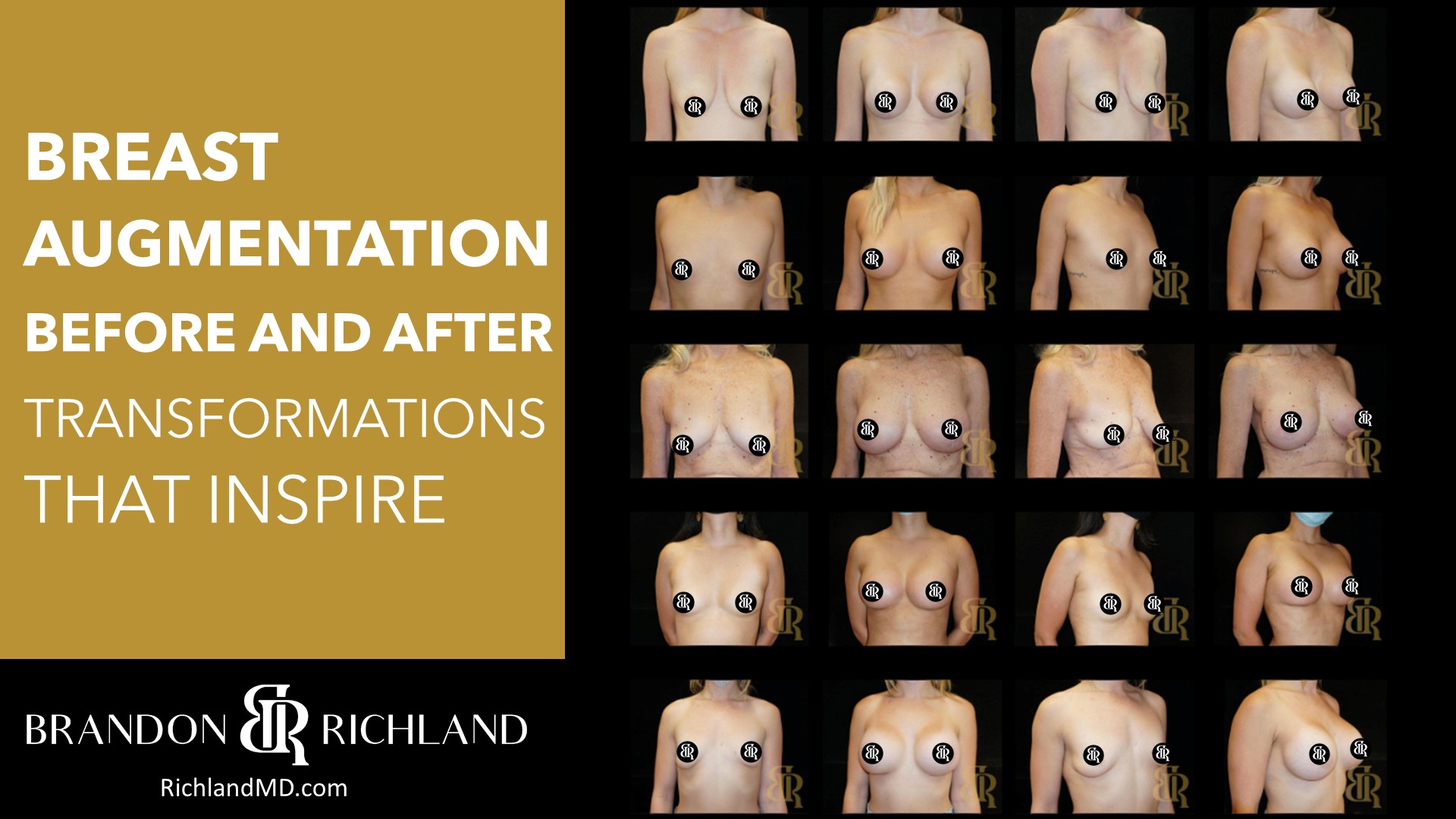
Thinking about breast augmentation? It’s normal to have lots of questions, especially about the results. Seeing breast augmentation before and after photos can give a better sense of what to expect. These images help visualize the transformations and guide your decision-making process.
The photos usually show different outcomes based on techniques, personal goals, and the experience of the plastic surgeon. Comparing these before and after images can help identify what’s possible and what matches your desired look.
It’s also important to know that each person’s results can vary. Factors like your body’s shape, the type of implants used, and the surgeon’s skill can all influence the final outcome.
Key Takeaways of Breast Augmentation Before and After
- Breast augmentation photos help visualize potential results.
- The experience and skill of the plastic surgeon matter.
- Each individual’s results can vary significantly.
Understanding Breast Augmentation
Breast augmentation involves surgical procedures to enhance the size and shape of the breasts. This often includes choosing between various types of implants and selecting a qualified surgeon.
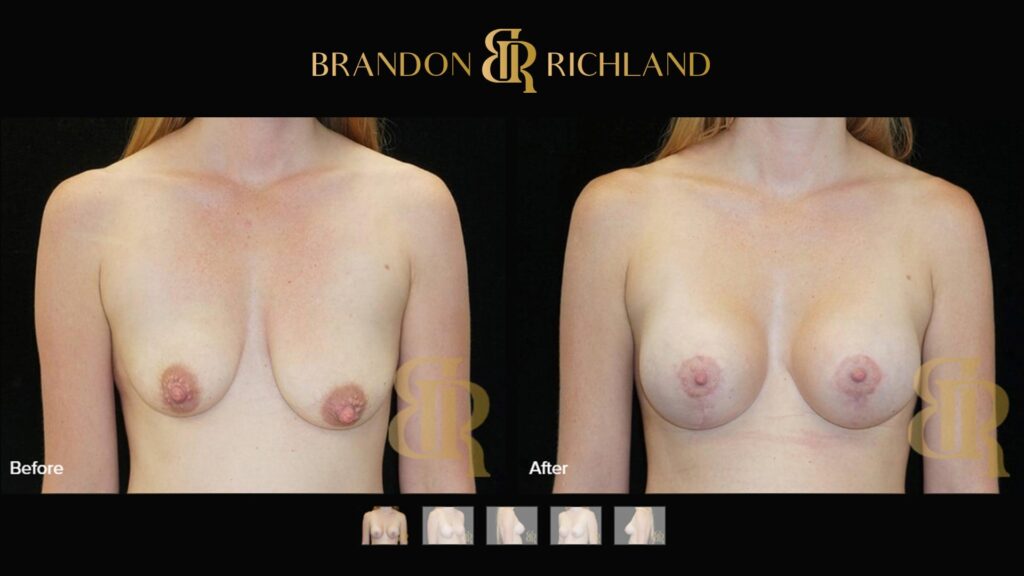
Types of Implants
Two main types of implants are commonly used: silicone and saline. Silicone implants are filled with silicone gel, which feels more like natural breast tissue. Many patients prefer them for their realistic feel. Saline implants are filled with sterile salt water. They are inserted empty and then filled once in place.
Silicone implants are recommended for their natural appearance and feel. Saline implants might be chosen for those who want adjustable sizes or who prefer the safety of a saline solution. Patients must discuss with their surgeons which type is best for them based on body type and desired results.
Preparing for Your Breast Augmentation Procedure
Getting ready for breast augmentation involves several important steps. These include meeting with your surgeon and evaluating your health and lifestyle to ensure the best outcome.
Initial Consultation
During the initial consultation, the surgeon will assess the patient’s goals and medical history. This meeting is crucial as it sets the foundation for the procedure. The surgeon will discuss the type of implants, their size, and placement options.
They will also show before and after photos of previous patients to help set realistic expectations. Questions about breast augmentation recovery process, and potential risks should be addressed during this time. Planning ahead can help manage any concerns and ensure a smoother experience.
Health and Lifestyle Evaluation
A thorough health and lifestyle evaluation is essential before breast augmentation. Patients may need to undergo a blood test and stop smoking to reduce risks. It is also important to avoid aspirin and certain anti-inflammatory drugs that can increase bleeding.
Staying hydrated and eating a healthy diet is recommended. Women over 40 may need a mammogram to track changes in breast tissue. Preparing your body can help ensure a safe procedure and promote quicker recovery.
Breast Augmentation Surgical Techniques
Breast augmentation can be customized through different incision options and implant placement methods, each with its own benefits and considerations. The choice of technique depends on the patient’s body type and the desired outcome.
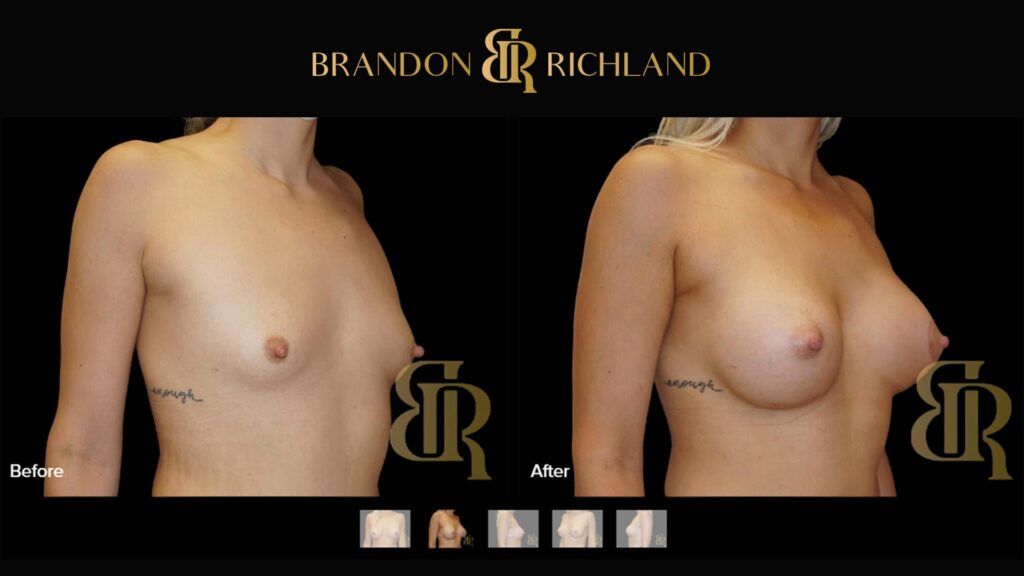
Incision Options
Surgeons have several common options for making incisions during breast augmentation. Inframammary incisions are made in the fold under the breast, providing good access and camouflaging scars in the natural crease. This method is commonly used because it allows for precise placement of the implant.
Periareolar incisions are made around the edges of the areola. This approach minimizes visible scarring and works well for women who also want a breast lift.
Axillary incisions are placed in the armpit, keeping scars away from the breast. This can be a good option for women who prefer no scarring on the breast itself.
Each incision option has its own pros and cons, and the best choice depends on individual anatomy and aesthetic goals.
Implant Placement Methods
There are two primary methods for placing implants: submuscular and subglandular.
Submuscular placement involves positioning the implant under the pectoral muscle. This method can produce a more natural look and reduce the risk of complications such as capsular contracture. It is often recommended for women with less natural breast tissue.
Subglandular placement positions the implant above the muscle and directly behind the breast tissue. This approach typically has a quicker recovery time and avoids muscular distortion during physical activity.
The choice between submuscular and subglandular placement will depend on factors like the patient’s lifestyle, body type, and personal preference.
Postoperative Recovery After Breast Augmentation
Proper recovery after breast augmentation enhances healing and helps achieve the best results. Key recovery phases include immediate aftercare and long-term healing. Each phase has specific steps and recommendations to ensure optimal recovery.
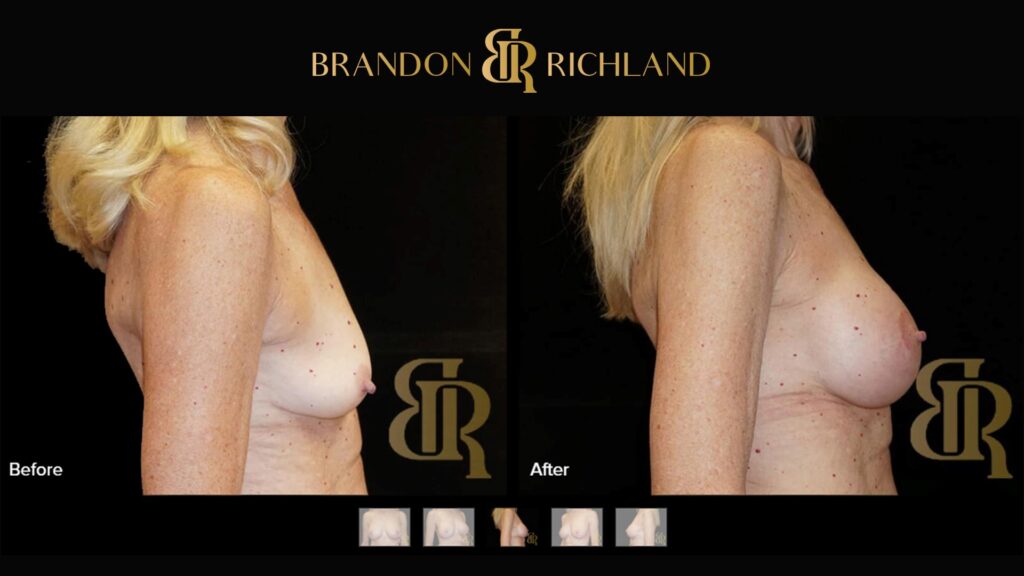
Immediate Aftercare
Inmediate breast augmentation aftercare is crucial. Patients may experience discomfort, swelling, and bruising in the first 48 hours. Pain management is essential during this time. Medication prescribed by the doctor can help manage pain and reduce inflammation.
Patients should lie on their backs to avoid disturbing the positioning of the implants. Keeping their upper body elevated can help reduce swelling.
Wound care is essential. Patients should clean the incision sites as advised by their surgeon to prevent infections. They might be instructed to wear a support bra to minimize movement and support the healing tissues. Light activities can resume, but heavy lifting and strenuous exercise should be avoided.
Long-Term Healing
Long-term healing involves the body’s adaptation to the implants and further reduction of post-surgical symptoms. Swelling and bruising gradually diminish over several weeks. It is important to attend follow-up appointments with the surgeon to monitor progress and address any concerns.
Physical activities can slowly increase after a few weeks. However, patients should always follow their surgeon’s advice on when to return to work, exercise, or other activities.
Patients must take care of their nutrition and hydration to support overall health and recovery. Drinking plenty of water, eating a balanced diet, and avoiding smoking can promote faster healing.
Lastly, monitoring for complications is important. Any unusual symptoms, such as severe pain, excessive swelling, or signs of infection, should be reported to the healthcare provider immediately.
Before and After: Visualizing Breast Augmentation Results
Breast augmentation often includes sharing before and after photos to help potential patients see the changes they can expect. These images also demonstrate the experience and skill of the plastic surgeon.
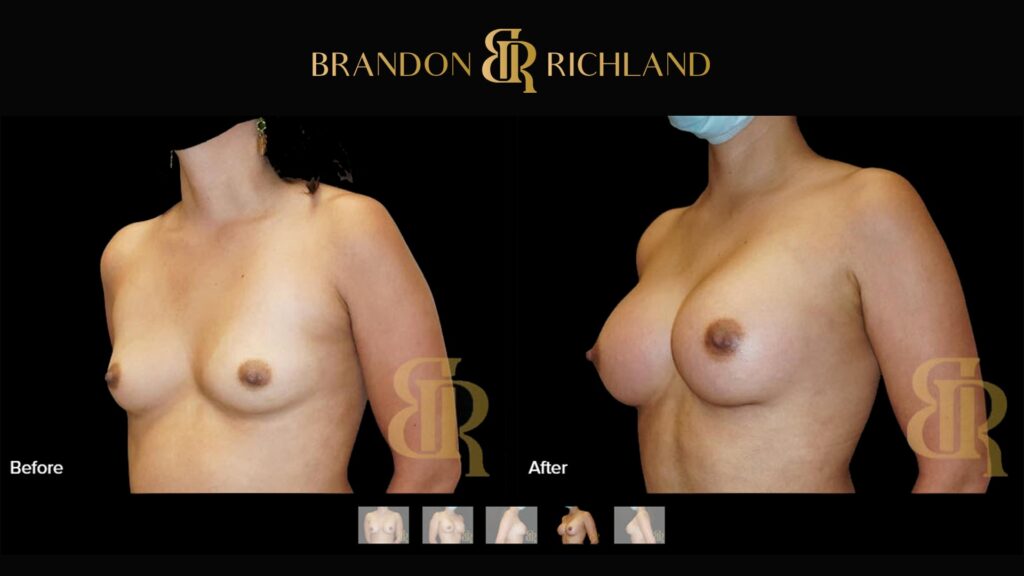
Before and After Gallery
Viewing a before and after gallery can give potential patients a clear idea of typical results. These galleries typically include professional photos taken from various angles. This allows viewers to see the full scope of the transformation. Surgeons may showcase various body types to illustrate how results can differ. These photos also help patients see scars, healing progress, and final outcomes.
Having access to these galleries helps in building trust with the surgeon. Potential patients can verify the surgeon’s experience level and aesthetic approach. This transparency helps them make informed decisions.
Frequently Asked Questions About Breast Augmentation Before and After
1. What Are The Expected Changes After Breastfeeding with Breast Implants?
Many women with breast implants wonder how their breasts will change after breastfeeding. Some might notice a slight change in shape or size. It’s important to discuss these potential changes with a surgeon.
2. How Do Different Implant Sizes Affect The Overall Appearance Post-Surgery?
Implant size can greatly affect the final look. Smaller implants tend to provide a more subtle enhancement while larger implants offer a more noticeable change. Examining before-and-after photos can be helpful in visualizing the difference.
3. What Should I Anticipate in Terms of Appearance with Ultra High Profile Implants Over Time?
Ultra high profile implants create a more dramatic, round appearance. Over time, these implants may remain more prominent and less natural-looking compared to moderate profile implants. Discussing expectations with a surgeon can provide clarity.
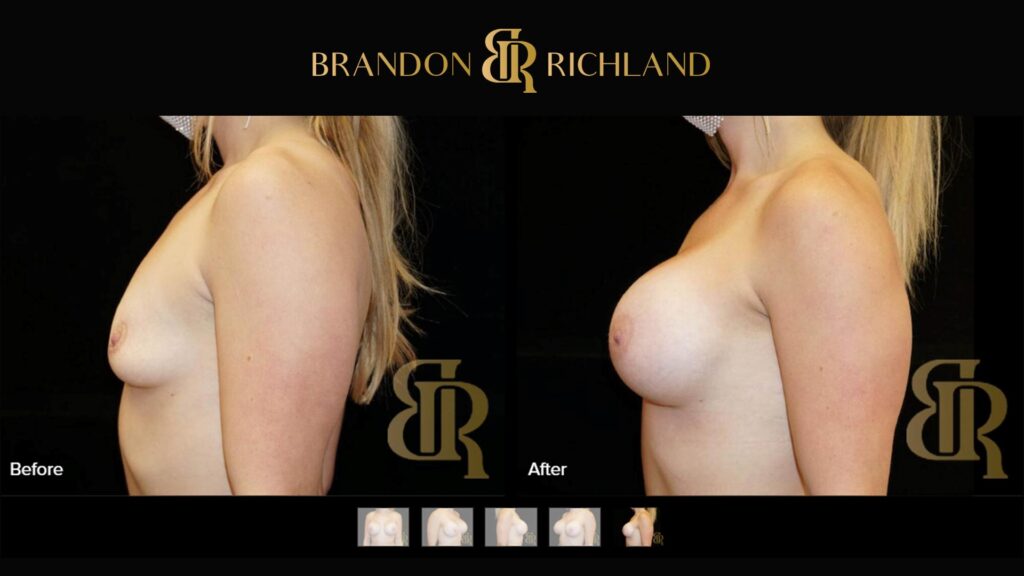
Conclusion and Summary of Breast Augmentation Before and After Transformations to Inspire
Breast augmentation remains a popular and transformative plastic surgery procedure for many individuals, enhancing both physical appearance and self-confidence. The journey from initial consideration to post-surgery results involves several key steps, often facilitated by reliable sources such as specialized plastic surgery websites and professional office consultations.
By leveraging resources such as informative websites and direct contact through office visits or email, patients can navigate this transformative experience with confidence. Breast augmentation offers a path to improved self-esteem and personal fulfillment when approached with thorough preparation and professional guidance.
Breast augmentation procedure encompasses a journey of careful planning, skilled surgical intervention, and diligent postoperative care. The transformation can significantly enhance an individual’s quality of life, provided they have made informed decisions and received high-quality medical care.
Please note that this article is intended for informational purposes only and should not be construed as medical advice. Before making any changes to your treatments, please consult with your healthcare provider to discuss the appropriateness and safety of such changes.
Ready For Your First-Class Cosmetic Experience in Orange County (OC) California (CA)?
Are you located in one of these Orange County (OC) / Southern California cities?
Aliso Viejo, Anaheim, Brea, Buena Park, Costa Mesa, Coto de Caza, Cypress, Dana Point, Fountain Valley, Fullerton, Garden Grove, Huntington Beach, Irvine, La Habra, La Palma, Laguna Beach, Laguna Hills, Laguna Niguel, Laguna Woods, Ladera Ranch, Lake Forest, Los Alamitos, Mission Viejo, Newport Beach, Orange, Placentia, Rancho Santa Margarita, San Clemente, San Juan Capistrano, Santa Ana, Seal Beach, Stanton, Tustin, Villa Park, Westminster, or Yorba Linda?
Plastic Surgeon Dr. Brandon Richland, MD and our Cosmetic Aesthetics Team are ready to help you look and feel your absolute best.
Elevate your confidence and self esteem levels to unfathomable new heights!
Schedule your in-person consultation in our modern and luxurious offices in either Fountain Valley, CA (Main HQ) or our Newport Beach, CA office.
Do you live outside of Southern California or short on time? For your convenience, Virtual Consultations are also available.
Our warm and engaging Team of carefully selected Aesthetics Professionals will make you feel calm, cool, collected, and right at home throughout your entire consultation and surgery process.
Schedule Your Aesthetics Consultation here, or call us directly at 949-867-4496 today.
About the Author

Dr. Brandon Richland, MD is a respected Board Certified Licensed Plastic Surgeon in Orange County / Southern California specializing in cosmetic and reconstructive surgeries.
Driven by his passion for medicine, Dr. Richland obtained his Doctor of Medicine (M.D.) degree from the prestigious program at Saint Louis University (SLU) School of Medicine in 2013. His exceptional skills were recognized when he received the McGraw Hill / Lange Medical Student Academic Achievement Award, and graduated top of his class with Honors. For his undergraduate degree, he attended University of California, Los Angeles (UCLA) and graduated with Honors in 2009.
To further enhance his surgical expertise, Dr. Richland completed his Residency in Plastic Surgery at the University of California, Irvine (UCI) from 2013 to 2019 earning the Academic Achievement Award twice during this period. A total of 14 years in dedicated schooling and medical residency.
Dr. Richland is actively involved with healthcare and medical societies, as a Diplomate of the American Board of Plastic Surgery, a member of the American Society of Plastic Surgeons, American Society of Aesthetic Plastic Surgeons, and the California Society of Plastic Surgeons.
Contact Dr. Richland today by visiting RichlandMD.com, scheduling a cosmetic consultation, or by calling 949-867-4496 directly.










